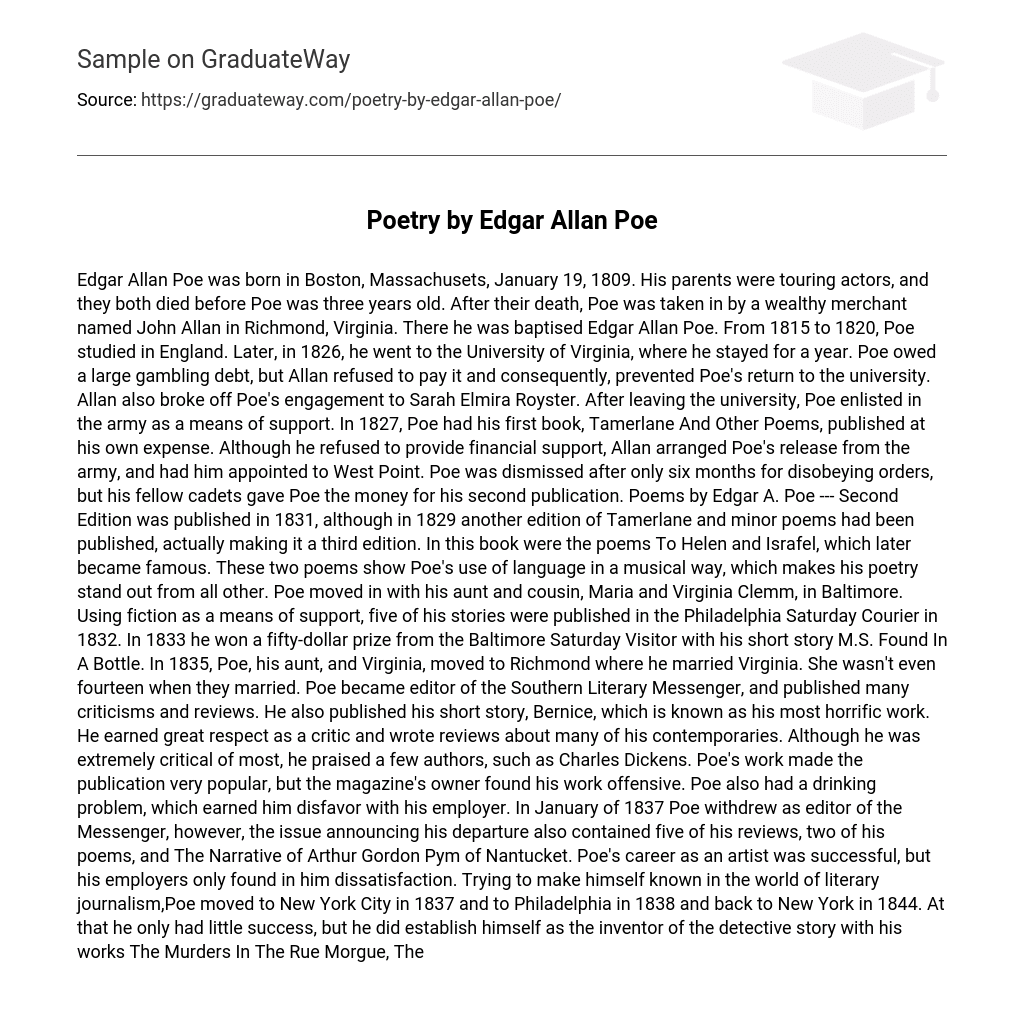Edgar Allan Poe was born in Boston, Massachusetts on January 19, 1809.
Before the age of three, Poe’s parents, who were actors on tour, died. After their death, a wealthy merchant named John Allan in Richmond, Virginia took care of Poe. It was during this period that Poe was baptized and given the name Edgar Allan Poe. From 1815 to 1820, he studied in England. Later, in 1826, he joined the University of Virginia for a year. However, Poe accumulated a large gambling debt that Allan refused to pay off. Consequently, Allan prevented Poe from returning to the university.
Allan also ended Poe’s engagement to Sarah Elmira Royster. After leaving university, Poe joined the army to support himself. In 1827, Poe self-published his first book, Tamerlane And Other Poems. Even though Allan didn’t offer financial backing, he arranged for Poe to be released from the army and placed in West Point. Poe was expelled after disobeying orders for just six months, but his fellow cadets funded his second publication. Poe’s poems by Edgar A.
In 1831, Poe’s work was published for the second time. However, it is important to note that in 1829, Tamerlane and minor poems had already been published as an edition before this one, effectively making it a third edition. This edition included two famous poems by Poe called To Helen and Israfel. These poems demonstrate Poe’s unique use of language and incorporate a musical quality into his poetry that sets it apart from others. Afterward, Poe lived with his aunt Maria and cousin Virginia Clemm in Baltimore. In order to support himself financially, he started writing fiction and saw five of his stories published in the Philadelphia Saturday Courier in 1832. The next year, 1833, he won a fifty-dollar prize for his short story M.S. from the Baltimore Saturday Visitor.
Found In A Bottle. In 1835, Edgar Allan Poe, his aunt, and his wife Virginia relocated to Richmond. Virginia was not yet fourteen when they got married. Poe assumed the role of editor at the Southern Literary Messenger and presented numerous critiques and reviews. Additionally, he released his chilling short story titled Bernice, which remains renowned as his most terrifying piece of work.
Despite being highly critical of most writers, Edgar Allan Poe gained great respect as a critic and wrote reviews about many of his contemporaries, including Charles Dickens. His work greatly increased the popularity of the publication, but unfortunately for Poe, the magazine’s owner found it offensive. Alongside this predicament, Poe struggled with a drinking problem which caused his employer to view him unfavorably. In January of 1837, Poe made the decision to step down as editor of the Messenger. However, in an ironic turn of events, the issue announcing his departure also included five of his reviews, two poems he wrote himself, and The Narrative of Arthur Gordon Pym of Nantucket. While Poe experienced success in his artistic career and earned respect from others in the field, sadly his employers only saw dissatisfaction in him.
Poe relocated to New York City in 1837 and then to Philadelphia in 1838, before returning to New York in 1844, with the aim of establishing himself as a prominent figure in literary journalism. Despite limited success, Poe gained recognition for pioneering the detective story genre through notable works such as The Murders In The Rue Morgue, The Purloined Letter, and The Mystery of Marie Roget. Throughout all his poems, Poe’s exceptional command of melodious language is evident, particularly in the hauntingly beautiful verses of The Raven. His literary theories have continued to strongly influence both short prose and poetry by emphasizing the importance of creating a distinct and singular impact. Although Ligeia held a special place in Poe’s heart as his finest tale, “The Pit and the Pendulum”, “The Fall of the House of Usher”, and “The Masque of the Red Death” have emerged as some of his most widely acclaimed works.
Despite the loss of Virginia in January 1847, Poe continued his work and in 1849, he went back to Richmond. There, he delivered lectures and reunited with his former fiancée whom he had been apart from since 1826. In that same year, Poe was found unconscious on a Baltimore street and his death was attributed to “brain congestion” according to an obituary published by the Baltimore Clipper. While there were suspicions about his mental state, the actual cause of Poe’s demise remains unknown. This ambiguity may have been intentional as Poe had a fondness for puzzles.





